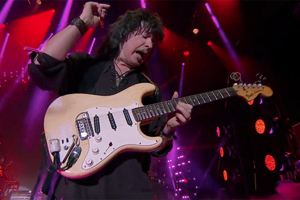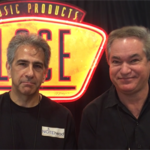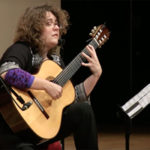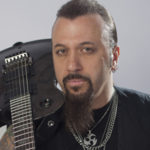Blackmore talks about Rainbow, Renaissance music and following his muse
By Gary Graff
December 22, 2017
Though he does not enjoy as much notoriety (perhaps on purpose) of some of his British guitar peers of the mid-’60s on, there’s no question Ritchie Blackmore is one of the pre-eminent figures in rock guitar heritage — and, now, beyond. First with Screaming Lord Sutch, then with Deep Purple and Rainbow, Blackmore seared his way into the six-string pantheon with heavy riffs, classically inspired solo patterns and inventive harmonics. He could thunder through “Smoke On The Water” in one moment, then play “Greensleeves” the next. In fact, he’s been doing more of the latter during the past two decades with Blackmore’s Night, a collaboration with his wife Candace Night that’s released 10 albums of Medieval Renaissance music featuring mandolins, hurdy-gurdys and other acoustic folk instruments, though he has been incorporating some electric guitar into the mix on more recent releases. Blackmore reactivated Rainbow in 2015, and the group has played selected shows in Europe, released two new studio singles and a pair of live albums. Blackmore’s Night remains his primary concern, but Blackmore is clearly interested in keeping his creative palette open…
FGPO: One of the big stories has been your return to rock during the past couple of years after focusing on Renaissance and Medieval music since the late ‘90s. What led to that?
Blackmore: It was kind of like I was 70, and I just felt like playing some rock ‘n’ roll on a few dates. So I basically put together the right players to do a few shows, just playing the old rock stuff, Purple stuff and Rainbow. I was doing it, one, for the fans and, two, for the nostalgia, and the singer I found [Ronnie Romero] is very exciting. He’s got a great voice, a cross between, like, Dio meets Freddie Mercury. So this would mean kind of exposing a new singer to the masses, and I’m sure he’ll become pretty famous because of his voice, so that was interesting.
FGPO: You have a history of launching singers into the world. Did you think about going back to any of them for this?
Blackmore: Not really, no. I wasn’t too fond of doing it with the old guys ’cause I’ve done that and I would like to go forward in whatever way I can.
FGPO: So where does Rainbow, and rock, fit in your musical realm now?
Blackmore: The Rainbow thing was a bit of fun that I do every now and again just so I can kind of blast out on the Stratocaster. But I still prefer the music of Blackmore’s Night because it’s so far-reaching and the spectrum of musical stuff is so more vast than being in a rock band. But at the same time I knew there were a lot of fans that wanted to hear the old Rainbow songs, so I did six weeks on the road playing rock ‘n’ roll and then did the more classically inclined acoustic music.
FGPO: What’s the biggest difference between the two?
Blackmore: The [Blackmore’s Night] stuff is murder on the hands! [laughs] Those instruments are very demanding, physically, to play.
FGPO: You’ve released a couple of new studio songs with Rainbow. Any chance of a full album?
Blackmore: We’re thinking about it. I think it’s an interesting concept of going off into a rock ‘n’ roll realm again. You have to think different about the progressions. It’s very hard to write a rock ‘n’ roll song on the acoustic guitar ’cause you can’t do too much melody, so we’ll see.
FGPO: Rainbow has only played in Europe so far. Will you do something in America?
Blackmore: I hope so. It would be nice to tour more in America. There are a lot of people that want to see that, we just haven’t got around to the logistics of everything.
FGPO: You’ve been doing Renaissance and Medieval music for 20 years now. What’s the allure?
Blackmore: I love this type of music. It’s the purest form of music. Medieval Renaissance music has always excited me. I was obviously told by people that were making a lot of money from Deep Purple and Rainbow and what have you, promoters, management and agents basically implied that we were wasting our time playing this music because it wouldn’t make any money. We still went ahead with it, because we loved it. We loved money, but we loved the actual music. We were quite prepared to play to 100 or 200 people and just keep the costs down, but it’s been growing since then and we’re playing to, like, 1,500 or 2,000 on average.
FGPO: And your notoriety from the rock world seems to be winning converts to the music, too.
Blackmore: It’s weird how it did take off, yeah. I think if the public sees that you love something so much they go along with it to a point. In fact, one of the quotes we have from one of our fans was: “I don’t like Renaissance music but I love your version of Renaissance music,” so that was quite a big compliment.
FGPO: Are there stronger pockets for it around the world?
Blackmore: Well, we’re always somewhere in Europe. It would be nice to tour more in America, but America doesn’t seem to be on the same wavelength as what we’re doing. What I’ve noticed with American music is it’s more into the blues and the kingbees and people playing 12 bars, whereas our music is much more melodic, has a heavy emphasis on the melody. I’ve noticed America doesn’t go for the melody; They go for the rhythm and more of a bluesier thing.
FGPO: You’ve incorporated more electric guitar into the Blackmore’s Night in recent years. How do determine where and how it fits?
Blackmore: I don’t know how to answer that. I just play what I play, and it’s how I feel at the time. I don’t really work these things out. I’ll have the riff in mind or the progression, and I’ll just play it. I don’t think: ‘Oh, I’ll use an electric guitar on this part;” I just do it, and hopefully it works out. It’s confusing because my frame of mind on the day we record as to whether we make it an electric song or whether we follow the acoustic path…that’s always a challenge to kind of figure out which way we’re going ’cause we can go both ways. It’s just a matter of keeping your fingers crossed and playing.
FGPO: Is there a songwriting method you have with Candice?
Blackmore: Not really. People always say: “Do you still practice?” Practice to me is like breathing, so I’m always sitting around with a guitar, and if I come up with an interesting riff or progression I think we haven’t used, I’ll put it to Candi and see how she deals with it just by humming the melody. And if it has potential we take it from there and then I’ll say to her something like: “Well, I kind of visualize this kind of thing,” like a tavern song or a battle song or whatever, and she goes off and usually writes these incredible lyrics very quickly. It’s a lot of trial and error right in the beginning. It’s a great natural process.
FGPO: Is that different from the way you did things in the other bands?
Blackmore: In the old days, we would book rehearsals where everybody would turn up and people would look at each other and go: “What ideas do you have?” and it was all very unnatural. This way, if I come up with an idea I’m excited about, I can play it to Candi there and then we take it from there. It’s very natural. It’s not contrived like in the old days when we’d be in the studio with no ideas, and we had to just come up with some progression and pretend we had a song around.
FGPO: Deep Purple’s in the Rock and Roll Hall of Fame now, but she chose not to attend the ceremony. Any regrets?
Blackmore: Personally, I couldn’t care less. I’m not really a fan of that stuff. Considering some of the people that are in the Hall of Fame, I’m not sure if it’s a good idea. So I don’t care one way or the other, actually. I think our fans seem to care more than I do. They’re always saying: “You should be in the Hall of Fame! You should be in this, you should be in that!” If I can pay the bills, that’s all I care about.






